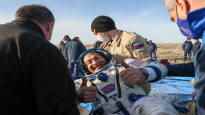The Russian government has banned its researchers from attending international conferences and the Russian scientific community is boycotting the Russians. The war has cut off research in many areas that relied on a united world, writes journalist Johannes Blom.
Throughout history, wars have often propelled the development of science and brought new technology, such as microwave ovens or air-conditioning tape, into the everyday life of reconstruction. The development of missile technology also brought gunpowder to space-time rocket programs.
This is the framework in which the relationship between war and science is often told. War gives reason to fund everything that can serve its interests and give birth to new technology as a by-product in later times of peace.
But now the war in Ukraine is not pushing science forward, tearing the community apart and cutting off research that relied on a united world.
Cooperation in higher education and research with many universities around the world, including Finns, with Russia and Belarus has been suspended due to the war.
The Cold War the spirit is fed in Russia with the idea that the great power does not need others for its great scientific achievements. The idea crashes into the fact that the world has already changed. Dichotomy does not create achievements, it creates recession.
The 2020s will go down in history as one of the most special decades in science. I dare say it now, even though there is still a small eternity left in the current tenth.
When the corona pandemic began its first rounds around the planet, it combined international research in a whole new way. Scientists around the world joined forces to find out what this virus was, where it came from and how it could be defeated.
Science has shown its importance during a pandemic. Now the situation threatens to turn on its head due to both Russian actions and boycotts by the West.
It is difficult to give an unequivocal answer, but one thing is certain: science cannot afford a new Cold War.
Conquest of space is probably symbolically the largest science of the West and the East. It is often remembered as a race to the stars in a bipolar world, but the concept does not reflect the present.
Astronauts even got to visit the Baikonur Space Center, which had previously been largely hidden from Western gaze. At the latest after the break-up of the Soviet Union, international co-operation became commonplace in space flights.
The International Space Station (ISS), which became operational in the early 2000s, is largely a Russian-American collaboration (you move to another service) thanks to. The United States is an important financier of the station, and Roskosmos handles transportation to the station on Soyuz vessels.
At least five ESA projects are now looking for new space tickets as Russia keeps its rocket in place due to economic sanctions.
Among them, for example, is the long-prepared Rosalind Franklin Marshal, which was to head to the red planet as early as this year.
The failure of space exploration, particle physics, medicine, or indeed any other science in the footsteps of war politics is a major setback for humanity, which is still searching for its place in space, only getting to know its own body, and trying to save its planet from environmental catastrophe.
If by their actions despots can scrap the scientific worldview, we will take a step back towards the Middle Ages.
This is ‘s daily analysis of the current theme of the Russian invasion. You can discuss the topic until 11pm on Friday night.
